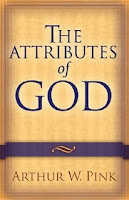Wednesday Wisdom #2: Holiness and Grace
In the recent years (and perhaps always), there have been many men who have decided they are going to define God how they think He should be, instead of how scripture portrays Him. This is a dangerous business, as most of these men write and preach and otherwise espouse their heresies to a world that wants to hear things about God that will make them feel warm and fuzzy inside. But scripture makes it clear that God is not only love and mercy, but also holy and just.
Last Christmas my brother gave me a list of books that he has found helpful in his own Christian walk with God. One of those books was The Attributes of God by A.W. Pink. I usually have a hard time reading through books that contain such old-fashioned language, but this one was so helpful in helping me understand who God is, that I worked my way through it without hesitation. This book is included on my Favorite Books page, which you can find here. But I give you fair warning: Not everything you read in it will be what you want to hear. This is not a book to tickle your ears. Some of it was really convicting for me. But all of it was backed clearly by scripture. If you want to learn about the God of the Holy Bible and who He is according to Scripture, this is a great resource. Of course, the Bible itself is the best resource!
I have chosen to share a passage with you today regarding God’s holiness and how it has been so distorted by both Non-Christians and Christians alike. In fact, if we had a proper view of God’s holiness, I would venture to say that we would be appalled by our lack of sensitivity to sin. I hope you enjoy this excerpt:
God’s holiness from a worldly perspective
The unregenerate do not really believe in the holiness of God. Their conception of His character is altogether one-sided. They fondly hope that His mercy will override everything else. “Thou thoughtest that I was altogether as thyself” (Psalm 50:21) is God’s charge against them. They think only of a “god” patterned after their own evil hearts. Hence their continuance in a course of mad folly. Such is the holiness ascribed to the divine nature and character in Scripture that it clearly demonstrates their superhuman origin. The character attributed to the “gods” of the ancients and of modern heathendom is the very reverse of that immaculate purity which pertains to the true God.
An ineffably holy God, who has the utmost abhorrence of all sin, was never invented by any of Adam’s fallen descendants! The fact is that nothing makes more manifest the terrible depravity of man’s heart and his enmity against the living God than to have set before him One who is infinitely and immutably holy. His own idea of sin is practically limited to what the world calls “crime.” Anything short of that, man palliates as “defects,” “mistakes,” “infirmities,” etc. And even where sin is owned at all, excuses and extenuations are made for it.
The “god” which the vast majority of professing Christians “love” is looked upon very much like an indulgent old man, who himself has no relish for folly, but leniently winks at the “indiscretions” of youth. But the Word says, “Thou hatest all workers of iniquity” (Psa 5:5). And again, “God is angry with the wicked every day” (Psa 7:11). But men refuse to believe in this God, and gnash their teeth when His hatred of sin is faithfully pressed upon their attention. No, sinful man was no more likely to devise a holy God than to create the Lake of Fire in which he will be tormented forever and ever.
Because God is holy, acceptance with Him on the ground of creature doings is utterly impossible. A fallen creature could sooner create a world than produce that which would meet the approval of infinite Purity. Can darkness dwell with Light? Can the Immaculate One take pleasure in “filthy rags” (Isa 64:6)? The best that sinful man brings forth is defiled. A corrupt tree cannot bear good fruit. God would deny Himself, vilify His perfections, were He to account as righteous and holy that which is not so in itself; and nothing is so which has the least stain upon it contrary to the nature of God.
But blessed be His name, that which His holiness demanded, His grace has provided in Christ Jesus our Lord. Every poor sinner who has fled to Him for refuge stands “accepted in the Beloved” (Eph 1:6). Hallelujah!
Pink, Arthur W. (2010-04-05). The Attributes of God (p. 44). . Kindle Edition.


